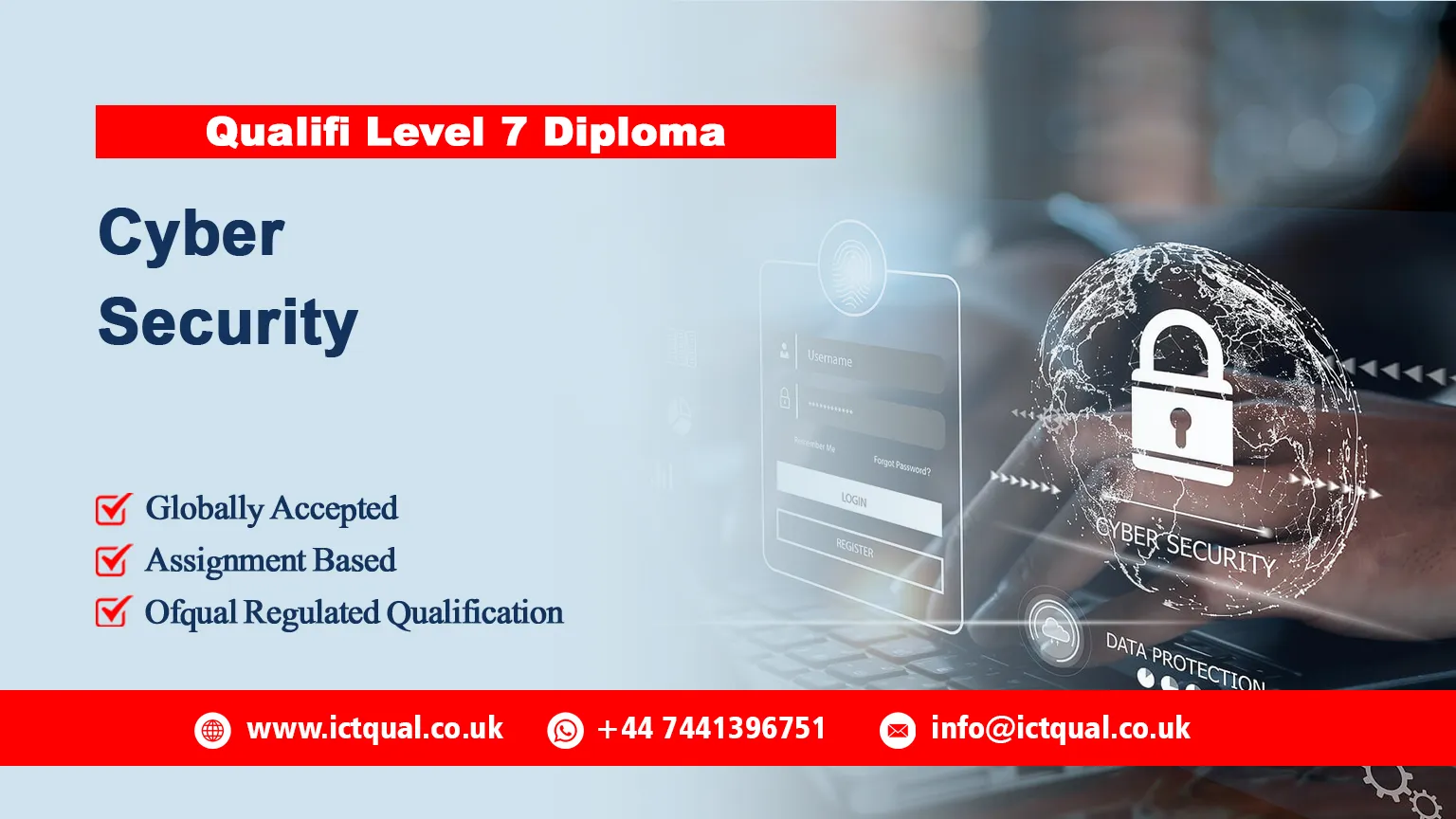n an age where cyber threats are becoming increasingly sophisticated and pervasive, safeguarding digital assets and information has never been more critical. The Qualifi Level 7 Diploma in Cyber Security offers a premier educational opportunity for professionals dedicated to mastering the art and science of protecting information systems from cyber threats. This advanced qualification is designed for those who aspire to enhance their expertise in cyber security and take on pivotal roles in securing digital environments.
Cyber security is the backbone of modern digital infrastructure, crucial for safeguarding sensitive information, ensuring business continuity, and protecting personal privacy. With the rise of complex cyber-attacks, from ransomware to data breaches, organizations are in desperate need of skilled professionals who can defend against and respond to these threats. The Qualifi Level 7 Diploma in Cyber Security addresses this urgent need by providing a comprehensive curriculum that covers both the strategic and technical aspects of cyber security.
The Qualifi Level 7 Diploma in Cyber Security is meticulously designed to provide a deep and broad understanding of advanced cyber security concepts and practices. The course encompasses a wide range of topics, including network security, ethical hacking, and cyber threat management.
Earning the Qualifi Level 7 Diploma in Cyber Security significantly enhances career prospects, preparing graduates for senior roles in cyber security management, consultancy, and strategy. It positions professionals as experts capable of leading cyber security initiatives and safeguarding organizational assets.
In an era where cyber threats are a constant and evolving challenge, the Qualifi Level 7 Diploma in Cyber Security offers a crucial pathway for professionals seeking to advance their expertise and make a significant impact in the field of cyber security. With its comprehensive curriculum, practical focus, and emphasis on emerging technologies, this diploma equips graduates with the advanced skills and knowledge needed to protect digital assets and lead cyber security initiatives.
Whether you are looking to advance in your current role or step into a new career in cyber security, the Qualifi Level 7 Diploma is a valuable asset that will enhance your capabilities and open doors to new opportunities. Secure your future in the digital world with this advanced qualification and become a leader in the fight against cyber threats.
The Qualifi Level 7 Diploma in Cyber Security is an advanced qualification designed for professionals seeking to deepen their expertise and advance their careers in the rapidly evolving field of cyber security. This comprehensive diploma offers an in-depth exploration of sophisticated cyber security concepts and practices, preparing graduates to tackle complex security challenges and lead initiatives to protect digital infrastructures.
The course curriculum is meticulously structured to cover a wide range of critical topics essential for modern cyber security. Students will engage with advanced subjects such as network security, ethical hacking, and incident response.
They will learn to implement robust security measures, conduct thorough vulnerability assessments, and respond effectively to cyber threats. The program emphasizes practical application, providing hands-on experience through simulations and real-world scenarios to ensure that students can apply their knowledge in dynamic and challenging environments.
In addition to technical skills, the diploma also focuses on strategic management of cyber security. Students will gain insights into designing and implementing security policies, managing cyber risk, and ensuring compliance with relevant laws and regulations. This strategic perspective equips graduates with the ability to align cyber security strategies with organizational goals and effectively manage security operations.
The Qualifi Level 7 Diploma in Cyber Security also incorporates a forward-looking approach by addressing emerging threats and cutting-edge technologies. Topics such as artificial intelligence in cyber security and advanced persistent threats are covered, ensuring that students are prepared to address the latest developments in the field.
Flexible learning options, including online, blended, and classroom-based formats, make the diploma accessible to working professionals. This flexibility allows students to balance their studies with their career and personal commitments. Overall, the diploma provides a thorough and practical education in cyber security, equipping graduates with the advanced skills and strategic insights needed to excel in high-level roles and lead successful cyber security initiatives.
The Qualifi Level 7 Diploma in Cyber Security qualification consists of 5 mandatory units of 120 credits for the completed qualification.
Mandatory Units
| Sr# | Unit Title |
|---|---|
| 1 | Fundamentals of Cyber Security |
| 2 | Network, Infrastructure and Systems Security |
| 3 | Applications of Cyber Security |
| 4 | Security Management and Governance |
| 5 | Cryptography |
This course is designed for:
- Experienced IT Professionals: Individuals with a solid background in information technology who are looking to specialize in cyber security or transition into higher-level security roles. This course provides advanced knowledge and skills that can enhance their expertise and open up new career opportunities.
- Cyber Security Specialists: Professionals currently working in cyber security roles who seek to deepen their understanding of complex security concepts, risk management, and strategic response. The diploma offers advanced training that can help them progress to senior positions.
- IT Managers and Directors: Those in managerial or leadership roles within IT departments who need to understand strategic cyber security principles and practices. The course equips them with the skills to oversee cyber security initiatives and lead incident response efforts effectively.
- Forensic Analysts and Investigators: Individuals involved in digital forensics who require advanced training in investigative techniques, evidence handling, and the use of specialized forensic tools. The diploma provides the skills needed for high-level investigative work.
- Business Continuity and Risk Management Professionals: Those working in business continuity or risk management roles who need to integrate cyber security considerations into their strategies. The course offers insights into how to manage and respond to major cyber incidents from a strategic perspective.
- Compliance Officers: Professionals responsible for ensuring that organizations adhere to regulatory requirements related to data protection and cyber security. The diploma covers the relevant standards, regulations, and legislation that impact compliance efforts.
- Senior Executives and Strategic Leaders: Individuals in senior leadership positions who need to understand the role of cyber security within broader organizational strategies. The course helps them grasp how to align security practices with overall business goals and regulatory requirements.
Here are the outcomes for each of the listed study units:
- Master Key Cryptographic Principles and Modes: Develop a comprehensive understanding of fundamental cryptographic principles, including symmetric and asymmetric encryption, hashing algorithms, and digital signatures. Gain expertise in various cryptographic modes such as CBC (Cipher Block Chaining), and GCM (Galois/Counter Mode), and their applications in ensuring data confidentiality and integrity.
- Navigate Standards, Regulations, and Laws Related to Encryption: Acquire in-depth knowledge of the standards, regulations, and legal frameworks governing encryption practices for both business and government organizations. Understand key legislation such as the General Data Protection Regulation (GDPR), the Health Insurance Portability and Accountability Act (HIPAA), and other relevant national and international regulations affecting encryption and data protection.
- Understand Core Principles of Digital Investigations: Explore the essential principles of digital investigations, including the identification, preservation, and analysis of digital evidence. Learn about the methodologies and best practices for conducting thorough and legally sound investigations in various cybersecurity contexts.
- Utilize Tools for Professional Digital Investigations at a Strategic Level: Gain proficiency in applying advanced digital forensic tools and technologies to support strategic-level investigations. This includes leveraging software for data recovery, analysis, and evidence management, as well as understanding their role in enhancing investigative outcomes.
- Plan and Manage Investigations and Forensics Teams: Develop skills in planning and managing effective investigations and forensics teams. This involves designing investigation frameworks, coordinating team activities, and ensuring the alignment of forensic efforts with organizational goals and compliance requirements.
- Understand Physical and Human Resources for Major Cyber Security Incidents: Learn about the physical infrastructure and human resources necessary for managing major suspected cyber security incidents. This includes understanding the requirements for secure facilities, specialized equipment, and the roles and responsibilities of key personnel involved in incident response.
- Apply Business Continuity Management to Major Incident Planning and Response: Master the principles of Business Continuity Management (BCM) in the context of major incident planning and response. Learn how to integrate BCM practices into incident management strategies to ensure organizational resilience and continuity in the face of significant cyber threats.
- Understand the Role of Senior Leaders and Strategic Leadership: Examine the critical role of senior leaders and strategic leadership in cyber security. Understand how executive decisions and leadership influence the development and implementation of cybersecurity strategies and policies.
- Evaluate Management Streams and Performance Monitoring Mechanisms for Information Security: Develop the ability to assess management streams and performance monitoring mechanisms related to information security. Learn how to evaluate the effectiveness of security controls, compliance measures, and performance metrics to ensure the robustness of information security management systems.
- Understand the Impact of Data Protection Legislation on Strategic Leadership: Gain insight into how data protection legislation affects strategic decision-making and leadership. Understand the implications of legal requirements on strategy-setting and how to align organizational strategies with regulatory obligations to maintain compliance and protect sensitive data.







